- Home
- Heather Grothaus
The Highlander's Promise Page 5
The Highlander's Promise Read online
Page 5
“That gel was always trouble to me,” Archibald continued on a wheeze. “That’s why I gave ye over to Marcas and his wife. I wanted a proper heir at last. One with some sense. Some dignity.”
The damning remarks about his mother struck Lachlan like fists. “I’m still your heir.”
“Yer nae grandson o’ mine,” the Blair lisped, and his hollowed cheeks trembled. “I believed his death had saved us, same as everyone else. But he ran like the coward he was. And so this is how I shall pay for my lie, by at last speakin’ the truth: ’Twas from a traitor’s loins you sprang. Dead to me—the three of you, at last. Dead to me.”
Lachlan rose to his feet. “Grandfather—”
Harrell rose up and laid his palm on Archibald’s pate. “That’s enough, Archie. Sure, you might say something you later wish you hadna.”
“Get out,” Archibald commanded hoarsely, closing his eyes. “Get out and doona return. Drive you from the town, mongrel dog.”
“Grandfather!” Lachlan demanded, the first real spirals of panic beginning to twist his insides, just like when he was eight and Marcas had made him ford the falls for the first time on his own. The slippery rocks, the cold, crashing water…
And there was Marcas again, taking hold of his arm. “Come on, leave it for the night, Lach,” he murmured. “Give him time.”
“Get out,” Archibald muttered, rocking his head on his thin pallet, his eyes still squeezed shut. “Get him away.”
Lachlan was in such shock that he let his foster father move him toward the door, the other men rising and following them through the longhouse. The crisp air was no longer springlike on the green, but pushed into his nostrils with the lung-searing iciness of December, and Lachlan felt the exquisite chill as Harrell stepped through the door and faced Lachlan. He knew all the eyes in the group were on him.
Cold water rushing over his head, flooding his throat, his fingers and toes numb…
Be the Blair, Lachlan.
Lachlan squared his shoulders and looked around the group. “I wasna present for the whole of what the Englishman had to say. But the words on his fancy paper mean nothing. English law doesna rule us.”
“Yours is the only English blood in the town,” Harrell interjected, and his gaze was cool, level. “English, and Carson. And ’tis nae the paper that has damned you as much as the Blair himself.”
Lachlan clenched his teeth together. “The chief only needs time,” he ground out, clinging to the words Marcas had murmured to him. “In a few days, all will be as it was. Certainly by the wedding.”
But Harrell was already shaking his head. “I’ll nae be shackling my daughter to a Carson’s bastard.”
Lachlan lunged for the man without thought, and it took both Marcas and brawny Cordon Blair to hold him back.
“Mind what you say to me, Harrell. I’m the same man I was when you promised Searrach to me. She’s to be my wife.”
“I’ll say what I’ve a mind to, pup, and naught a word less. I could have truly been yer da but for the chief’s stubbornness, and we’d be havin’ none o’ this now. Shame.” Harrell turned back to the Blair’s door. “I’ll watch over him through the night, lest he take another turn.” And he disappeared inside.
Lachlan shook off the hands that held him, his vision throbbing with the rage that pushed blood against his eardrums.
Cordon placed his hand on Lachlan’s shoulder. “Doona worry yourself. It will all be as it should. We will raise a cup together, you and I, when you are chief, Lach.”
Lachlan nodded, but he could not answer his friend.
The rest of the fine turned toward their own homes singly and in pairs, with no farewells, no calls of good night or further encouraging words for Lachlan. In a moment, only he and Marcas and Dand were left on the green before the Blair’s house.
Marcas spoke first. “We’ll give the Blair the night. Sure, Archibald’s had a shock. I ken you’re angry, Lach, and Harrell had no leave to so offend you. But we canna risk further division in the clan now that old troubles with the Carsons have risen.”
“I canna risk, you mean?” Lachlan demanded. “That’s why they came, is it nae? Whatever it was the Englishman told them, they carried grievance for it to the fine.”
It was clear that Marcas was carefully weighing his response. “Aye. In part. It concerns the treaty.”
“I want that message,” Lachlan said, and he held out his hand. “I have a right to read with my own eyes that which has damned me.”
Marcas reached into his shirt at once and withdrew the sheets of paper. But before he handed them over, he held Lachlan’s gaze. “What happened all those years ago—you are to blame for none of it. I know you’re a good man, Lachlan.” The words sounded like a warning.
Lachlan pulled the papers from Marcas’s grasp. “I’m the man you raised me to be. The man this clan raised me to be.” He turned and began walking back across the green.
Dand’s footfalls quickly caught up with his. “Da’ll talk sense to him, you’ll see. Sure, tomorrow the Blair will have thought things through differently.”
But what if he doesn’t think things through differently? The words ran unbidden through Lachlan’s mind, and the memory of the old man’s condemnation rose up before him like a specter.
Yer nae grandson o’ mine…Dead to me.
Lachlan didn’t know what Marcas could say that would change the Blair’s sudden hatefulness toward him, even considering that Marcas was the chief’s cousin.
Lachlan stopped in his tracks as the implications of the thought blossomed. If not for Lachlan, Marcas—and then Dand—would have been in line to lead Clan Blair.
“What is it, Lach?” Dand asked, looking up at Lachlan eagerly.
Does he even realize? Lachlan wondered.
“Nothing. I’ll be at the store,” Lachlan said. “I need to be alone for a bit.”
Dand seemed to hesitate for a blink, but then nodded. “Sure. I’ll see that Mam keeps some supper for you.”
He doesn’t realize he could be chief because he doesn’t care.
Lachlan couldn’t reply past the constriction in his throat, so he turned away and pushed into the storehouse, closing the door behind him. He waited there in the dark until he heard Dand’s strides growing faint, and then Lachlan unlatched the clasp that held the upper and lower halves of the storehouse door together. He swung open the top half and hooked it to the wall so that it remained open, and then he turned to find the lamp on the post.
The low flame gave just enough light to illuminate the luxurious piles of fragrant hay and barrels of oats in the generous space. Lachlan moved the lantern to a post nearer a tall stack of dried grass opposite the door and then collapsed back onto it, the papers still gripped in his hand across his chest. He let his gaze go through the doorway, across the green, where the standing torches were dying, the Blair’s house only the faintest suggestion of gray roofline in a blacker night.
What could these pages say that could possibly give his grandfather cause to hate him?
Icy water holding him down, his foot slipping from the rock so that he fell deeper into the churning maelstrom. He couldn’t get a grip. Where was Marcas…?
Lachlan’s shudder jarred him back to the warm glow of the storehouse: quiet, fragrant, safe. He carefully unfolded the pages and began to read.
13 February 1458
To Edna Blair, or if deceased, the fine of Clan Blair, especially Archibald Blair:
Dearest Edna,
I will tell straightaway that which is of dire importance: if you bore my child these score and ten years ago, you and that child—anyone of my blood—are in grave danger. Gather your things at once and leave Town Blair and tell no one where you go.
’Twas not the Carsons who attacked Town Blair…
Thomas pressed his back into the smooth bark of the t
ree, the dawn light illuminating the cold mist swirling along the forest floor. All around him in the thick and smoky air were the sounds of active battle: swords clanging, shouts of attack and surprise, the screams and groans of the dying. He stood in the forest between Loch Acras and the sea draped in a Blair shawl, watching for more dark shapes of men through the trees. If he removed the shawl, any Blair who happened to see him would cut him down; if he left it on, it marked him as an enemy to the Carsons. He had no friends here.
He closed his eyes for a moment and forced himself to swallow, take a deep breath. He must only think of surviving this battle, staying hidden and alive long enough to smuggle Edna and Geordie from the dying, starving town without any more bloodshed. Edna, with her dark eyes and impossibly long, brown curls; Archibald Blair’s defiant daughter, who had cared for him in his captivity.
You must take me with you, she’d panted into his ear, her small, upturned breasts like pears, her body frantic atop him while he lay chained in the storehouse. I would take my own life rather than starve or lie beneath Harrell. Men like me. You like me. You must…
There was no help, no kin to be had for him here in the midst of these warring, bitter strangers. Edinburgh, then. The king of Scotland was his only hope.
“Thomas!”
He froze, hoping, praying that it was no more than his terrified mind playing tricks on him. No one save a handful of Blairs knew his name.
“Thom…Thomas,” a man gasped again. “Thomas Annesley! Please, God, help me!” he sobbed.
Thomas stepped from behind the tree and was confronted by the sight of a young man staggering up the hill toward him. His hair frizzed from his head as if he had just come from his childhood bed, the gray light of dawn rinsing it colorless. He seemed like a religious icon from the East come to life, with his pale skin and upturned gaze, petitioning the heavens for the man he sought. But it could be no angel but a martyr who searched the woods for him, for Thomas saw the lad’s charred arm pressed against his flank, the wash of black blood that drenched his right side to his boots.
“Thom…as,” the young man wheezed.
“Here,” Thomas called. “I’m here.”
The man halted, bringing his gaze slowly forward but obviously struggling to focus on Thomas’s face. He wobbled on his feet and then dropped to his knees. Thomas rushed to meet him on the ground, grabbing the man by his shoulders while his head lolled.
“I am Thomas Annesley,” he said. “Who are you? Where are your kin?”
“No kin here,” the lad whispered, looking up at last into Thomas’s face. A chill raced up Thomas’s spine at the phrase he himself had thought only a moment ago. “Vaughn…Hargrave.”
Thomas’s blood froze. “What?”
“Came by the bay.” The lad’s breath clicked in his throat, and he clutched at Thomas’s shirt. His mouth gaped, gasping with the effort to form words, and Thomas remembered the ball through his own lung, and how each inhalation had been all but worthless as his chest sucked air and filled with blood with each wheeze. “Looking for you. Kill everyone ’til he finds you. Kill us all. Heard him. Ships…gone.”
“Why are you telling me this?” Thomas asked, forcing the words through his throat while the woods seemed to burst with sunlight. Dawn, dawn was here, and there were footfalls in the leaves.
“Thomas…Annesley,” the lad whispered, and his fingers tightened on Thomas’s shirt, pulling him closer. “You’re…Carson. Kin.” The young man gave a stifled sob. “Run. Run.” The word was little more than formed air, and in the dawn light, Thomas could see the speckles of blood on the man’s gray lips. And then his eyes went vacant, still, in the morning mist, and his solid frame sagged in Thomas’s arms.
Thomas laid the lad in the cold, wet leaves, staring at his face as if he could decipher some relation in the features. Kin. He turned his head to peer through the trees in the shadows that still swirled along the bottom of the hill. Vaughn Hargrave had found him again. How? Did that mean he’d also found Harriet? Meg? Was Roscraig still standing? What of his friend, Iain Douglas?
Kill everyone ’til he finds you. Kill us all.
Thomas heard the footfalls coming closer, caught the English accents on the air. If there had been any hope left in him that this was nothing more than a feuding raid between clans, the man’s body before him was bitter evidence. And if what the dead man had said—and what Thomas knew of Hargrave—was true, everyone between Loch Acras and the sea was damned because of him. Thomas looked back at the young Carson, wondering that he could have been his family, could have come to know him, talk with him. They even shared similar coloring…
Kill everyone ’til he finds you.
Thomas moved without allowing himself to think of what he was doing, jerking out of the Blair shawl around his head and shoulders, lifting the young man’s body to place it gently around him and tuck it into his bloodied belts. Then Thomas reached behind him to rock a stone free from the mire at the base of the tree. It was bigger than it had looked when half-buried, and heavy. He raised it above his head.
“Forgive me,” he whispered.
He brought the rock down in the center of the man’s face as hard as he could, trying to block the crunch of flesh and bone from his ears. Again he struck, and again. Until his last spare glance confirmed that there were no discernible features among the blood and bits of flayed skin and muscle. Only blond hair and a Blair shawl.
Thomas staggered to his feet, the sudden chill cutting him to the bone. He heaved the rock to the south, where it crashed down the hill.
“Up there! I heard something!”
Thomas took the lad’s finely made, short sword from the leaves at his side and replaced it with the dagger given to him by his father, only returned to his possession last night by a frightened Archibald Blair. There was no other made like it, of that he was certain. And then Thomas ran north, perpendicular to the hill’s rise with the coast, away from Edna Blair and Geordie-boy, away from the Carsons, away from Vaughn Hargrave.
He ran and ran and ran.
Chapter 4
Finley sat at the table near the kitchen cupboard, her elbows on the wood, her chin in her hands, staring out the open doorway toward the center of town. The sun poured down on the rounded, thatched roofs and adorned each ripple of the bay beyond with blinding white jewels, and the warm breeze swirled the dirt and straw on the floor into tiny tempests. Finley could hear the buzz of the hungry bees from her seat. The path that led up the hill to their house remained irritatingly empty. She sighed.
“D’ye want a corner?”
She started and turned her head toward the fire; she’d nearly forgotten her mother was in the room. Ina sat in a low chair near the central hearth, a long piece of fabric in her lap, the end stretched tight in her hoop. She gestured with it toward Finley. “Come busy your hands.”
Finley sighed again and turned her gaze back to the door. “You’d just pick out all my stitches.”
“Maybe nae.” Finley could hear the smile in her mother’s voice. It was no secret that Finley didn’t share Ina’s talent for embroidery. “I doona mind. And sure, you’ll drive yourself mad going on like that. He’ll be back when he’s back.”
“I should have been allowed,” Finley grumbled. “It’s me they’re talking about.”
“Full of yourself, are ye nae?” Ina smirked. “They’ve been at it all night—’tis the treaty they’re discussing. They’ve been to the Town Blair twice in as many days. That’s two times more than they’ve been in ten years.”
“If it’s only the treaty, why wouldn’t Da take me?”
“Perhaps because you’re nae longer six, riding his shoulders in your plaits?” Ina suggested. Then she, too, sighed and dropped her stitchery to her lap. “Finley—”
“I don’t care who they choose,” she interrupted. “I willna have him. I don’t need a man coming in to
our home and behaving as if it all belongs to him.”
“But it will belong to him.”
“Nay,” Finley shot back. “And I am not a head of stock to be negotiated away with it.”
“That’s not how it is, and well you know it,” her mother chastised. “You had your choice of any of the men in the town.”
“Aye, all three and a half of them,” Finley muttered.
“Cheek. Your choice. Any one of them would make a fine husband and father.” She paused. “Save perhaps for Eachann Todde, but I’d hoped that’d scare some sense into you, to be threatened with one so aged.”
“Well, it didn’t work,” Finley mumbled.
“Apparently,” her mother said in an exasperated tone. “The town needs bairns if we are to survive; there arena enough young folk the way it is, as you so cleverly pointed out. You’ll just have to trust your da and the fine to choose the best match for you, and do your best to be a good wife.” She was quiet for a beat of time while Finley stewed at the injustice of it all. “I didna choose my first husband.”
Finley looked out the corner of her eye at her mother but didn’t say anything. It was rare that Ina spoke of the time before Finley was born, and she didn’t want to interrupt.
“And I didna want to marry Andrew either,” Ina said in a low, careful voice, her gaze going to the fabric in her lap. “He was too bold, too hot-tempered for the likes of me. Made me nervous,” she said with a smile in her voice.
“Did you love him?” Finley asked, fascinated by the change in her mother’s face, how the lines around her eyes and mouth softened as if only speaking of that time, so long ago, caused the years to melt away. She had been young once, too.
Ina nodded slowly. “Oh, sure I would have. I couldna’ve helped it. He made me jump whenever he walked into a room. Always had some grand idea he was thinking on. His eye on the old house. Only we called it the grand house then.”
Finley felt her brows raise as the image of the blackened ruin behind the town came to her mind. “He wanted to be chief?”

 The Highlander's Promise
The Highlander's Promise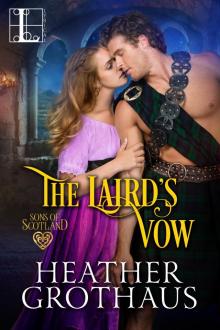 The Laird's Vow
The Laird's Vow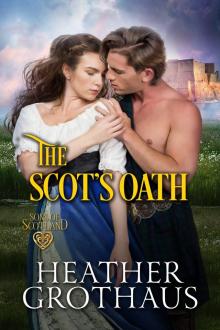 The Scot's Oath
The Scot's Oath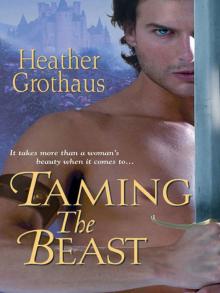 Taming The Beast
Taming The Beast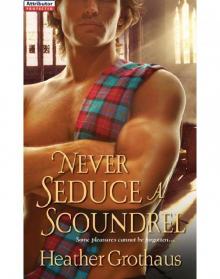 Never Seduce A Scoundrel
Never Seduce A Scoundrel Roman
Roman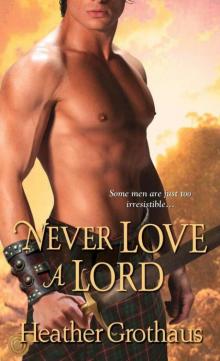 Never Love a Lord
Never Love a Lord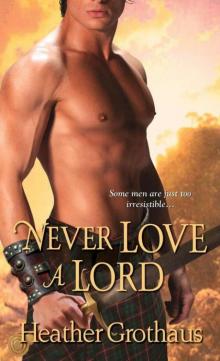 Never Love a Lord (Foxe Sisters)
Never Love a Lord (Foxe Sisters) Valentine
Valentine Adrian
Adrian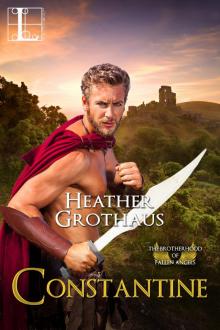 Constantine
Constantine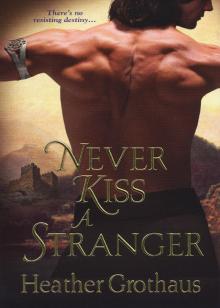 Never Kiss A Stranger
Never Kiss A Stranger